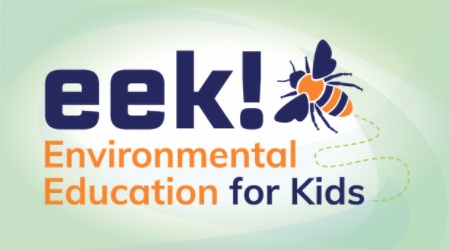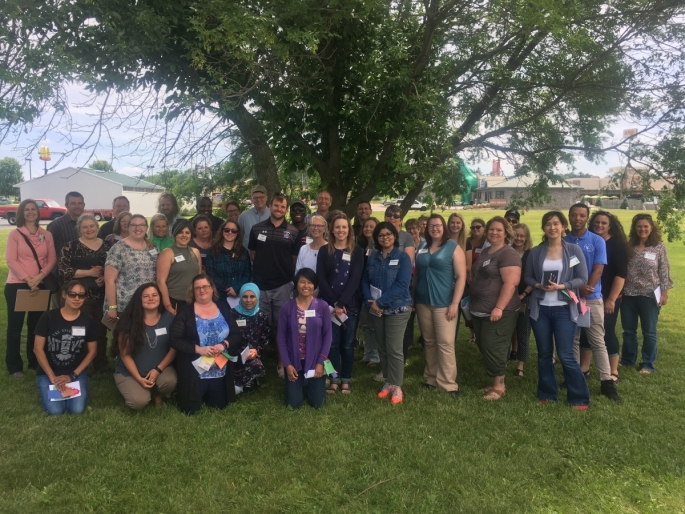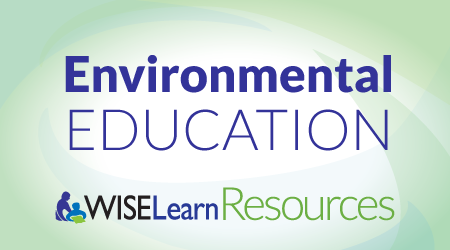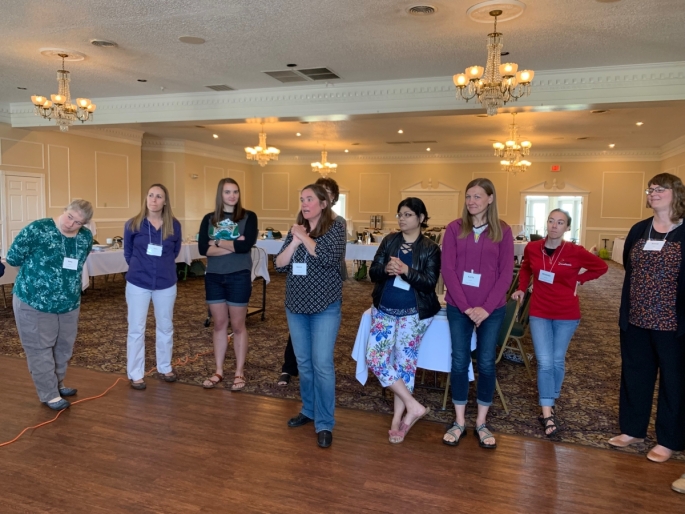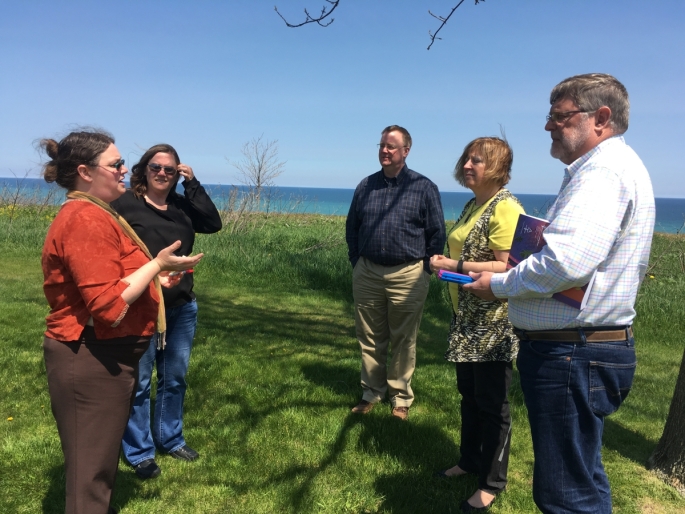Past TENFEE Summits
-
2022: Retention through Wellness and Nature in Educator Preparation Programs
Retention through Wellness and Nature in Educator Preparation Programs
The 12th annual summit was held online for the third year in a row due to the pandemic. The pandemic has taken a toll on the mental health of our students and staff. Educator preparation programs explore how to be more intentional in supporting the wellness of students through a connection to nature to help retain them in programs and in the teaching profession.
-
2021: Taking Education Outdoors: A Toolkit for Schools
- Funding: Wisconsin Society of Science Teachers and the Wisconsin Department of Public Instruction
- Product: Developed resources for Taking Education Outdoors: A Toolkit for Schools
- Partnership with the Connectivity Project
Participant Project Abstracts:
- Nature Journaling as a connection practice
One activity that can be used in the classroom are nature journals. This outline created by Dr. Patty Born can be utilized as a resource for teacher educators with step-by-step instructions. This activity chronicles time outdoors with a focus on physical health, emotional health, and community health/equity. View resource
- Teaching Science Outside
This resource outline created by Elizabeth Crotty takes into consideration on how educators can take their classes outdoors. It reviews what is needed to be considered before taking classes outdoors and what communication is needed beforehand as well. This outline covers a planning phase including a preparation checklist. View resource
- Model for Teaching Science Curriculum
Project Learning Tree’s “Explore Your Environment” can be utilized as a model to pre-service science curriculum instruction. The outline created by Dr. Kathleen Kremer explores NGSS concepts in the classroom and references PLT curriculum features. Included in this outline are other resources related to Place-Based Learning, Connectivity, Inquiry-Based Learning, Questioning, and Nature of Science (NOS). View resource
- Learning Outside: A Logistics Checklist for Before, During, & After Learning Outside with Your Students
Starting classroom learning outside can be difficult but this checklist created by Dr. Kendra Liddicoat, Dr. Amy Lindgren, Karla Lockman, Dr. Heidi Masters, and Dr. Jean Weaver covers may resources for educators to get started. Within this checklist, it covers the before, during and after stages of teaching outside. Included in each section are hyperlinks that can give more resources to guide educators in their preparation. View resource
- Redefining Curriculum—Mapmaking
One activity that can be utilized in the classroom is map-making. This outline created by Dr. Randa Suleiman is adapted from David Sobel “mapmaking with children” and highlights objectives goals, materials, additional resources, and a specific project outline relating to a creation of a Rebus Treasure Hunt. This activity is thoroughly integrated with socio-emotional learning (SEL) while prioritizing diversity, equity, and inclusion (DEI). View resource
- Empowering Educators in Marginalized Communities to Connect, Explore and Engage in their Greenspaces: A Summit for Pre-Service and In-service teachers in Marginalized Schools
This outline created by Dr. Corey L. Thompson is heavy with resources related to environmental education curriculum and green space experiences. As Thompson connected with multiple experts in the field, this guides pre-service and in-service teachers to the multiplicity of resources available to them to help introduce students from marginalized populations to environmental education and the great outdoors within their communities. Included are resources related to the LEAF, KEEP, UW and WICCI covering clean energy, school forests, restoration, conservation issues and a variety of other environmental related topics. One section also includes resources pertaining to Native Nations. View resource
- Forest Bathing Guide: For Educators
One activity that can be used in the classroom is the facilitation of forest bathing. This guide created by Jan Wellik, EdD, provides highlights of activities from M. Amos Clifford’s book – Your Guide to Forest Bathing. Through this guide, educators will be able to understand what forest bathing does and how it has health and social-emotional benefits. There is a group activity focus that creates an overall embodied awareness and other experiences for students. Other forest bathing resources such as books and videos are also mentioned. View resource
- “Adventure” Field Trips Planning Template
One activity that can be used in the classroom are adventure field trips. This template created by Dr. Kevin Zak utilizes David Sobel’s design principles for educators. Example tasks through the adventure field trips are included as well as specific curriculum standards in which this activity covers. View resource
-
2020: Connect, Explore, Engage with Educator Preparation Programs
Connect, Explore, Engage with Educator Preparation Programs
The 2020 TENFEE Summit was held online due to the pandemic with funding from the Wisconsin Department of Public Instruction. Participants created Environmental Literacy Plans and uploaded them to WISELearn.
-
2019: Energizing Pre-Service Teacher Education Programs and In-Service Teacher Collaborators
Energizing Pre-Service Teacher Education Programs and In-Service Teacher Collaborators
In 2019 the TENFEE event was held at the Wintergreen in the Wisconsin Dells and funded by Wisconsin Society of Science Teachers and KEEP—Wisconsin's K-12 Energy Education Program. Faculty members and K-12 educators paired up to complete energy education research projects.
Major Topics:
KEEP Activities:
- Walking through activity book (battery example)
- Explore Wind and Sun
- Food Chain Game
- Coal Mining Cookies
Project Designs in Groups:
- Energy efficiency
- Wind
- Natural Resources
- Teacher efficacy/resources
- Learning assessment/extension
- Green spaces/food energy
Other Activities:
-
2018: Wisconsin Standards for Environmental Literacy and Sustainability
2018 Connect, Explore, Engage with Standards
This event was held at the Wintergreen in the Wisconsin Dells with funding provided by Wisconsin Department of Public Instruction for WISELearn.
Major Topics:
Product
- Created lessons related to the three strands in the standards: Connect, Explore, Engage
-
2017: Place-based Learning
2017 TENFEE Summit
This event was held in July in Madison with funding from the National Science Foundation with a follow-up meeting held in January 2018.
Environmental Education Activities for Teacher Educators: A Sampling from Wisconsin
These environmental education activities were created for teacher educators by teacher educators. Through a grant from the National Science Foundation (DRL 1638420), members of Wisconsin’s higher education programs were invited to participate in two workshops that provided professional development and time to create these activities. The teacher educators have also implemented these activities in their own courses.
The resource includes 34 activities that could be used to teach a range of disciplines and licensure levels. Additionally, they are aligned with the Professional Development of Environmental Educators: Guidelines for Excellence (NAAEE, 2017).
Major Topic:
- Place-Based Education with guest David Sobel
Other Activities:
-
EE in Wisconsin Presentation
-
NAAEE Guidelines Presentation
-
Creating school Team Plan Intro
-
Model Outdoor Activity
-
Interest Group formation and Discussion
-
Personal project
-
Interest Group Activity Sharing
-
2016: Project Learning Tree Facilitator Training
2016 TENFEE Summit
This event was held by the shores of Lake Michigan at Concordia University with funding provided by the Wisconsin Environmental Education Board, with in kind support from Concordia University and Project Learning Tree.
Major Topics:
- Project Learning Tree Facilitator Training
-
2015: NAAEE Guidelines for Excellence: Professional Development of Environmental Educators
- Focus: NAAEE Guidelines for Excellence: Professional Development of Environmental Educators
- Funding: North American Association for Environmental Education
- Hosted in partnership with the Midwest Environmental Education Conference
-
2014: NAAEE Guidelines for Excellence: Community Guidelines
2014 TENFEE Summit
This event was held in Stevens Point during the Wisconsin Association for Environmental Education annual conference with funding from the North American Association for Environmental Education.
Major Topics
- NAAEE Guidelines for Excellence: Community Guidelines Workshop
-
2013: Community-based Learning
2013 TENFEE Summit
This event was held in La Crosse during the Wisconsin Association for Environmental Education annual conference with funding support from Field Edventures (formerly Wisconsin Green Schools Network).
Major Topics:
-
Basics of Community-Based Learning Presentation
-
Overview of using WGSN Lab Schools for Student Training and Practicum Sites
-
General Research Discussion
Turkey Research Discussion
Applied working session
-
2012: Wisconsin’s Plan to Advance Education for Environmental Literacy and Sustainability in PK-12 Schools
2012 TENFEE Summit
This event was held at the Mead Wildlife Area and funded through a grant from the Wisconsin Environmental Education Board.
Major Topics
Additional Activities
-
2011: Pre-Service Educator Preparation Study Overview
2011 TENFEE Summit
The 2011 summer gathering of educator preparation programs was held at the Aldo Leopold Foundation in Baraboo, Wisconsin. Funding was provided by the Wisconsin Environmental Education Board Research Committee.
Major Topics:
- Teacher Preparation Study Overview
- Environmental Education in PK-12 Schools PI-8, PI-34
- No Child Left Inside: Wisconsin’s Plan to Advance Education for Environmental Literacy and Sustainability in PK-12 Schools
Additional Activities:
Educator Preparation Program Case Studies:
- UW-Stevens Point and UW-River Falls
- Wisconsin Lutheran College
- Edgewood College and Northland College
Discussions:
- Brainstorming challenges to get interdisciplinary involvement (Flip chart activity)
- Future of Collaboration
- How do we address challenges to interdisciplinary approaches?
- How does your institution prepare teachers to meet these State Environmental Literacy Goals 1 and 2?
- How does environmental education fit across your campus, within as well as beyond the school of education?
Opportunities for Research: How do you use this information moving forward?
Resources
-
Pre-2011
2001 — Energy funding hosted a small group interested in continuing, but no infrastructure to continue.
Mid 1990s — a group of higher education representatives. Event has good showing, but no infrastructure to continue.
